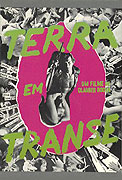Regie:
Glauber RochaDrehbuch:
Glauber RochaBesetzung:
Jardel Filho, Paulo Autran, José Lewgoy, Glauce Rocha, Danuza Leão, Darlene Glória, Maurício do Valle, Zózimo Bulbul, Irma Álvarez, Lauro EscorelInhalte(1)
Terra Em Transe (Entranced Earth), a bold, confrontational, vibrant picture that stands as one of the greatest pieces of work from the director widely considered to be the leader of Brazil s Cinema Novo movement. In the hypothetical Latin-American country of Eldorado, the idealistic and anarchist poet and journalist Paulo Martins (Jardel Filho) fights against the populist governor, Felipe Vieira (José Lewgoy), and the conservative president Porfirio Diaz (Paulo Autran), supported by revolutionary forces. Paulo is depressed, since the two corrupt politicians were his former friends and have been elected with his moral support. Paulo Martins opposes the two equally corrupt political candidates. Paulo is torn between the madness of the elite and the blind submission of the masses. (Verleiher-Text)
(mehr)Kritiken (2)
An interesting and not so opaque allegory of the Brazilian political situation, where there are cowards but also strong personalities, there are efforts that lead to different results than expected. It is about Brazil, even though the country is called Eldorado, but it can easily be related to any country. The finale beautifully illustrates this.
()
Contemporary progressive formal techniques in the service of the classical art figure, and satire on current events serving equally well as a statement on the bacchanalia of political power itself. The brilliant combination of both ends of the chain connecting classicism with modernity and the present with eternity. This is best seen in the final few minutes: the narrator's poetry as the auditory background and the visual caesura of the image through frenetic editing, a long close-up of the governor's face drunk with power crystallizes. It is in this overly stylized, overly awkward, and exaggerated gesture that we can precisely perceive the effect of classical art. Its awe-inspiring bombast and unrealistic exaggeration of the image of Napoleon on the revolting Marengo at the top of the Alps, the statue of Teresa of Ávila in an ecstatic whirl of orgasm, and the light draperies carved from stone is presented to us by Rocha (another example is the footage of the shot poet clutching his weapon in an act of self-sacrifice). This represents the main currency of the film. The classical influences (see also the use of poetry) are also demonstrated in the political message that Rocha presents to the audience – here, the most classic genre, tragedy, is the tragedy of an exploited and humiliated people, who are left with either servility or a radical, bloody but great (we are again at the sentimentality of the classics) rebellion against "fate."
()
Galerie (19)
Photo © Grupo Novo de Cinema e TV


Werbung